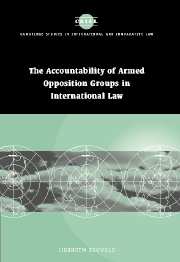Book contents
- Frontmatter
- Contents
- Table of treaties and declarations
- Table of cases
- Table of other documents
- List of abbreviations
- Introduction
- PART 1 THE NORMATIVE GAP
- 1 Legal restraints on armed opposition groups as such
- 2 Substantive obligations of armed opposition groups as such
- PART 2 THE ACCOUNTABILITY GAP
- Conclusion
- Bibliography
- Index
- CAMBRIDGE STUDIES IN INTERNATIONAL AND COMPARATIVE LAW
2 - Substantive obligations of armed opposition groups as such
Published online by Cambridge University Press: 28 July 2009
- Frontmatter
- Contents
- Table of treaties and declarations
- Table of cases
- Table of other documents
- List of abbreviations
- Introduction
- PART 1 THE NORMATIVE GAP
- 1 Legal restraints on armed opposition groups as such
- 2 Substantive obligations of armed opposition groups as such
- PART 2 THE ACCOUNTABILITY GAP
- Conclusion
- Bibliography
- Index
- CAMBRIDGE STUDIES IN INTERNATIONAL AND COMPARATIVE LAW
Summary
Now that the question of applicable law has been settled, the contents of the law applicable to armed opposition groups can be examined in some detail. International practice has given ample application to the obligation of armed opposition groups to treat persons in their power humanely, including obligations relevant to detained persons and penal prosecution of persons. Furthermore, there is considerable practice on the protection of civilians from the conduct of hostilities, including the prohibition on the use of land mines and the prohibition of starvation of civilians. Finally, international bodies have accepted the prohibition on reprisals with regard to armed opposition groups. However, although international bodies have accepted the applicability of a wide range of international norms to armed opposition groups, they have rarely indicated which measures these groups must take to be in compliance with these norms.
In the previous chapter it has been shown, on the basis of international practice, that armed opposition groups may, under particular circumstances, incur accountability for violations of human rights law. However, and notably, to the extent armed opposition groups are bound by human rights law, there is little discussion in international practice of the specific contents of their obligations under this law. This might be taken to suggest that this law does not add much to international humanitarian law from the point of view of substance, a point which will be addressed below.
- Type
- Chapter
- Information
- Publisher: Cambridge University PressPrint publication year: 2002

